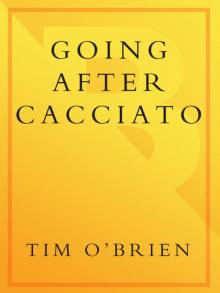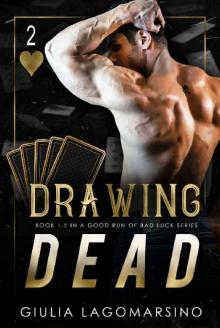Going After Cacciato


Author: Tim O'Brien
Category: Other
Published: 2009
Series:
View: 342
Read OnlineA CLASSIC FROM THE NEW YORK TIMES BESTSELLING AUTHOR OF *THE THINGS THEY CARRIED
"To call Going After Cacciato a novel about war is like calling Moby-Dick a novel about whales."
So wrote The New York Times of Tim O'Brien's now classic novel of Vietnam. Winner of the 1979 National Book Award, Going After Cacciato captures the peculiar mixture of horror and hallucination that marked this strangest of wars.
In a blend of reality and fantasy, this novel tells the story of a young soldier who one day lays down his rifle and sets off on a quixotic journey from the jungles of Indochina to the streets of Paris. In its memorable evocation of men both fleeing from and meeting the demands of battle, Going After Cacciato stands as much more than just a great war novel. Ultimately it's about the forces of fear and heroism that do battle in the hearts of us all.
Now with Extra Libris material, including a reader’s guide and bonus content
From the Trade Paperback edition.
**Amazon.com Review
"In October, near the end of the month, Cacciato left the war."
In Tim O'Brien's novel Going After Cacciato the theater of war becomes the theater of the absurd as a private deserts his post in Vietnam, intent on walking 8,000 miles to Paris for the peace talks. The remaining members of his squad are sent after him, but what happens then is anybody's guess: "The facts were simple: They went after Cacciato, they chased him into the mountains, they tried hard. They cornered him on a small grassy hill. They surrounded the hill. They waited through the night. And at dawn they shot the sky full of flares and then they moved in.... That was the end of it. The last known fact. What remained were possibilities."
It is these possibilities that make O'Brien's National Book Award-winning novel so extraordinary. Told from the perspective of squad member Paul Berlin, the search for Cacciato soon enters the realm of the surreal as the men find themselves following an elusive trail of chocolate M&M's through the jungles of Indochina, across India, Iran, Greece, and Yugoslavia to the streets of Paris. The details of this hallucinatory journey alternate with feverish memories of the war--men maimed by landmines, killed in tunnels, engaged in casual acts of brutality that would be unthinkable anywhere else. Reminiscent of Joseph Heller's Catch-22, Going After Cacciato dishes up a brilliant mix of ferocious comedy and bleak horror that serves to illuminate both the complex psychology of men in battle and the overarching insanity of war. --Alix Wilber
Review
NATIONAL BOOK AWARD WINNER
"Simply put, the best novel written about the war. I do not know . . . any writer, journalist, or novelist who does not concede that position to O'Brien's Going After Cacciato."
*—Miami Herald
"A novel of great beauty and importance."
*—Boston Globe*
"Stark . . . rhapsodic. . . . It is a canvas painted vividly, hauntingly, disturbingly by Tim O'Brien."
*—Los Angeles Times
"As a fictional portrait of this war, Going After Cacciato is hard to fault, and will be hard to better."
*—*John Updike, *The New Yorker*
"To call Going After Cacciato a novel about war is like calling Moby-Dick a novel about whales."
So wrote The New York Times of Tim O'Brien's now classic novel of Vietnam. Winner of the 1979 National Book Award, Going After Cacciato captures the peculiar mixture of horror and hallucination that marked this strangest of wars.
In a blend of reality and fantasy, this novel tells the story of a young soldier who one day lays down his rifle and sets off on a quixotic journey from the jungles of Indochina to the streets of Paris. In its memorable evocation of men both fleeing from and meeting the demands of battle, Going After Cacciato stands as much more than just a great war novel. Ultimately it's about the forces of fear and heroism that do battle in the hearts of us all.
Now with Extra Libris material, including a reader’s guide and bonus content
From the Trade Paperback edition.
**Amazon.com Review
"In October, near the end of the month, Cacciato left the war."
In Tim O'Brien's novel Going After Cacciato the theater of war becomes the theater of the absurd as a private deserts his post in Vietnam, intent on walking 8,000 miles to Paris for the peace talks. The remaining members of his squad are sent after him, but what happens then is anybody's guess: "The facts were simple: They went after Cacciato, they chased him into the mountains, they tried hard. They cornered him on a small grassy hill. They surrounded the hill. They waited through the night. And at dawn they shot the sky full of flares and then they moved in.... That was the end of it. The last known fact. What remained were possibilities."
It is these possibilities that make O'Brien's National Book Award-winning novel so extraordinary. Told from the perspective of squad member Paul Berlin, the search for Cacciato soon enters the realm of the surreal as the men find themselves following an elusive trail of chocolate M&M's through the jungles of Indochina, across India, Iran, Greece, and Yugoslavia to the streets of Paris. The details of this hallucinatory journey alternate with feverish memories of the war--men maimed by landmines, killed in tunnels, engaged in casual acts of brutality that would be unthinkable anywhere else. Reminiscent of Joseph Heller's Catch-22, Going After Cacciato dishes up a brilliant mix of ferocious comedy and bleak horror that serves to illuminate both the complex psychology of men in battle and the overarching insanity of war. --Alix Wilber
Review
NATIONAL BOOK AWARD WINNER
"Simply put, the best novel written about the war. I do not know . . . any writer, journalist, or novelist who does not concede that position to O'Brien's Going After Cacciato."
*—Miami Herald
"A novel of great beauty and importance."
*—Boston Globe*
"Stark . . . rhapsodic. . . . It is a canvas painted vividly, hauntingly, disturbingly by Tim O'Brien."
*—Los Angeles Times
"As a fictional portrait of this war, Going After Cacciato is hard to fault, and will be hard to better."
*—*John Updike, *The New Yorker*
 Scrambling (Out in the NFL Book 1)
Scrambling (Out in the NFL Book 1) Drawing Dead: A Small Town Romance (A Good Run Of Bad Luck)
Drawing Dead: A Small Town Romance (A Good Run Of Bad Luck) The Fae Artifactor
The Fae Artifactor Flight Risk
Flight Risk Her Cold-Blooded Protector
Her Cold-Blooded Protector The Nat Makes 7 (Mags & Nats Book 1)
The Nat Makes 7 (Mags & Nats Book 1) The Bride's Heart (Mail Order Bride: Brides And Promises Book 2)
The Bride's Heart (Mail Order Bride: Brides And Promises Book 2) Rock Star, Interrupted
Rock Star, Interrupted